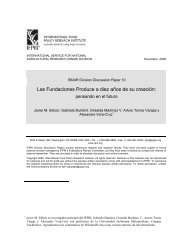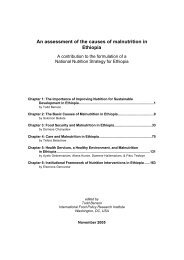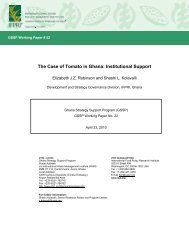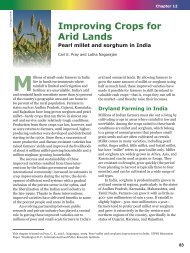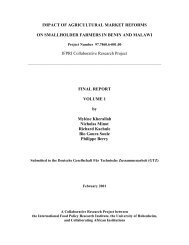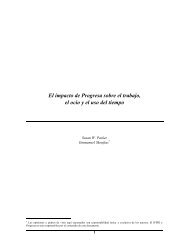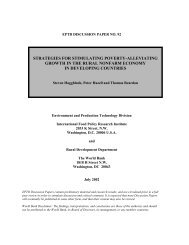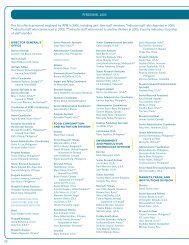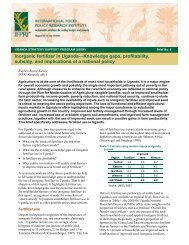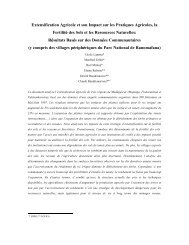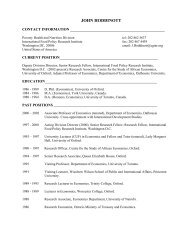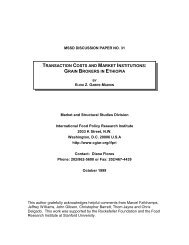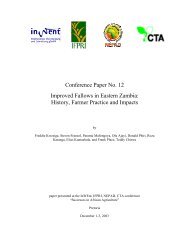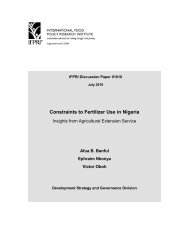An Economic Assessment of Banana Genetic Improvement and ...
An Economic Assessment of Banana Genetic Improvement and ...
An Economic Assessment of Banana Genetic Improvement and ...
Create successful ePaper yourself
Turn your PDF publications into a flip-book with our unique Google optimized e-Paper software.
188 ABOUT THE AUTHORS<br />
Mariana Rufino is currently a Ph.D. student with Plant Research International, Wageningen<br />
University, Wageningnen, The Netherl<strong>and</strong>s. She did her M.S. with the Plant Sciences Department,<br />
Production Systems Group, Wageningen University. The subject <strong>of</strong> her thesis is on-farm<br />
analysis <strong>of</strong> nematode infestation <strong>and</strong> soil fertility as constraints to the productivity <strong>of</strong> bananabased<br />
production systems in Ug<strong>and</strong>a.<br />
Melinda Smale leads a research program on economics <strong>and</strong> genetic resources at IFPRI <strong>and</strong><br />
IPGRI. Her research emphasizes the development <strong>of</strong> methods to assess the value <strong>of</strong> crop biodiversity<br />
<strong>and</strong> the identification <strong>of</strong> policies to enhance the utilization <strong>and</strong> management <strong>of</strong> crop<br />
genetic resources, particularly in developing economies. From 1994 to 2000, in Mexico,<br />
Melinda worked on crop genetic resources <strong>and</strong> technology adoption issues with CIMMYT.<br />
She conducted research in Malawi from 1989 to 1993 on hybrid maize adoption by smallholder<br />
farmers <strong>and</strong> maize research impacts, also with CIMMYT. During the 1980s, she<br />
worked in Pakistan, Somalia, Mauritania, <strong>and</strong> Niger on short-term assignments for CIMMYT,<br />
Chemonics International, Volunteers in Technical Assistance, <strong>and</strong> USAID. She obtained her<br />
Ph.D. in agricultural economics from the University <strong>of</strong> Maryl<strong>and</strong>, College Park, her M.S. in<br />
agricultural economics from the University <strong>of</strong> Wisconsin, Madison, <strong>and</strong> her M.A. specializing<br />
in Africa area studies from The Johns Hopkins School <strong>of</strong> Advanced International Studies,<br />
Washington, D.C.<br />
David Talengera is a researcher with the biotechnology unit <strong>of</strong> the National <strong>Banana</strong> Research<br />
Programme <strong>and</strong> a Ph.D. student at the University <strong>of</strong> Pretoria, South Africa. He studied cell<br />
<strong>and</strong> plant tissue culture under NARO <strong>and</strong> IITA’s joint banana breeding project between 1995<br />
<strong>and</strong> 2005. He obtained his M.Sc. <strong>and</strong> a B.Sc. in agriculture from Makerere University, Kampala,<br />
in 1994 <strong>and</strong> 1990, respectively.<br />
Wilberforce Kateera Tushemereirwe is program leader, NBRP, NARO, based at KARI.<br />
Since 1997, he has led a national team in R&D <strong>of</strong> the banana crop. For the past 4 years he has<br />
developed <strong>and</strong> implemented successful projects with the goal <strong>of</strong> building crop biotechnology<br />
capacity, with a team <strong>of</strong> young scientists eager to learn <strong>and</strong> apply biotechnology. Dr.<br />
Tushemereirwe also has extensive experience <strong>and</strong> expertise in formulating <strong>and</strong> managing research<br />
projects, using participatory approaches, communicating results to stakeholders, <strong>and</strong><br />
transferring technologies to the private <strong>and</strong> commercial sectors. He holds a Ph.D. in plant<br />
pathology <strong>and</strong> an M.S. in botany from the University <strong>of</strong> Reading, Engl<strong>and</strong>.<br />
Stanley Wood, senior scientist/program head, joined IFPRI in 1995 <strong>and</strong> until 1997 was<br />
outposted to the Centro Internacional de Agricultura Tropical in Cali, Colombia, working<br />
on impact assessment studies for regional agricultural research. Since then he has been<br />
based at IFPRI headquarters, where he initially lead IFPRI’s research on spatial analysis in<br />
a policy context <strong>and</strong> now co-leads IFPRI’s new Global Change program. Before joining<br />
IFPRI, he served as an independent consultant to multilateral <strong>and</strong> bilateral aid organizations<br />
on natural resource <strong>and</strong> agricultural systems modeling. He earned a B.E. in civil engineering<br />
from the University <strong>of</strong> Sheffield, Sheffield, Engl<strong>and</strong>, an M.S. in water resources development<br />
from the University <strong>of</strong> Birmingham, Birmingham, Engl<strong>and</strong>, <strong>and</strong> an M.S. in agricultural<br />
development <strong>and</strong> a Ph.D. in economics from the University <strong>of</strong> London.



